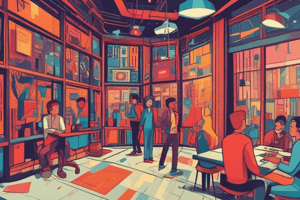Podcast
Questions and Answers
What is the main focus of social constructivism?
What is the main focus of social constructivism?
- The collaborative nature of learning (correct)
- Individual reflection and internal knowledge
- Static knowledge acquisition
- Isolation in personal understanding
How do social constructivists view the self?
How do social constructivists view the self?
- As a byproduct of individual experiences only
- As an isolated element from society
- As dynamic and influenced by external reality (correct)
- As a fixed and unchanging entity
Which of the following is NOT one of the five major social institutions?
Which of the following is NOT one of the five major social institutions?
- Education
- Economics
- Religion
- Technology (correct)
What does the term 'likeness' refer to in a social context?
What does the term 'likeness' refer to in a social context?
Which characteristic suggests that the self is isolated from the external world?
Which characteristic suggests that the self is isolated from the external world?
What role do social institutions play in society?
What role do social institutions play in society?
What aspect of social groups influences individual identity?
What aspect of social groups influences individual identity?
Which of the following best describes 'reciprocal awareness' in a social setting?
Which of the following best describes 'reciprocal awareness' in a social setting?
What is the primary idea behind Cooley's concept of the looking glass self?
What is the primary idea behind Cooley's concept of the looking glass self?
Which of the following is NOT one of the elements of the looking glass self?
Which of the following is NOT one of the elements of the looking glass self?
How does the concept of the 'cyber self' differ from the actual self?
How does the concept of the 'cyber self' differ from the actual self?
What role does social media play in the development of one's cyber self?
What role does social media play in the development of one's cyber self?
According to the concept of looking glass self, what is the final step in forming one's self-concept?
According to the concept of looking glass self, what is the final step in forming one's self-concept?
Why is the concept of the 'cyber self' significant in contemporary society?
Why is the concept of the 'cyber self' significant in contemporary society?
Which of the following reflects the primary focus of social constructivism as related to the self?
Which of the following reflects the primary focus of social constructivism as related to the self?
What assumption underlies Cooley's assertion that society is a mental construct?
What assumption underlies Cooley's assertion that society is a mental construct?
What role does culture play in Vygotsky's theory of knowledge acquisition?
What role does culture play in Vygotsky's theory of knowledge acquisition?
According to Vygotsky, what is the foundation of learning?
According to Vygotsky, what is the foundation of learning?
Which of the following best describes the nature of learning in Vygotsky's sociocultural theory?
Which of the following best describes the nature of learning in Vygotsky's sociocultural theory?
What does Vygotsky suggest about children in relation to knowledge?
What does Vygotsky suggest about children in relation to knowledge?
How does Vygotsky view the relationship between social settings and learning?
How does Vygotsky view the relationship between social settings and learning?
What aspect of cognitive development does Vygotsky's theory focus on?
What aspect of cognitive development does Vygotsky's theory focus on?
What does Vygotsky suggest about the influence of peers and mentors on learning?
What does Vygotsky suggest about the influence of peers and mentors on learning?
What foundational approach in education is closely associated with Vygotsky's sociocultural theory?
What foundational approach in education is closely associated with Vygotsky's sociocultural theory?
Flashcards are hidden until you start studying
Study Notes
Self and Social Constructivism
- The self is not isolated; it is constantly influenced by and interacting with the external world.
- Social constructivism emphasizes collaborative learning, highlighting that knowledge is developed through social interaction.
- The self is dynamic and not static; it evolves in response to societal influences.
Society and Social Institutions
- A society is defined as a group of individuals engaged in persistent social interactions or sharing a geographical or social territory.
- Social institutions fulfill social needs and have specific roles, norms, and expectations, impacting societal functioning.
- Key social institutions include family, education, religion, economics, and government; they interact and influence each other continuously.
Elements of Society
- Core elements influencing society include likeness, awareness, interdependence, cooperation, differences, and conflicts.
- Likeness among group members fosters mutual understanding and camaraderie.
Vygotsky’s Sociocultural Theory
- Lev Vygotsky’s theory emphasizes the role of culture in individual cognitive development, asserting that learning is largely a social process.
- Language is crucial for learning, supporting activities like reading, writing, logical reasoning, and reflective thinking.
- Learning occurs effectively in social contexts, particularly through collaboration on problem-solving tasks.
Cooley’s “Looking Glass Self”
- Charles Horton Cooley proposed that self-conception arises from actual experiences and perceptions of how one is viewed by others.
- The "looking glass self" entails three elements:
- Imagining how one appears to others.
- Anticipating others’ judgments about that appearance.
- Developing feelings based on perceived judgments.
Digital Self and Social Media
- The concept of the "cyber self" describes the curated version of oneself presented on digital platforms.
- Individuals can adopt multiple cyber selves for different social media, reflecting various aspects of identity.
- The cyber self remains present and subject to social feedback even when not actively engaged in those environments.
Studying That Suits You
Use AI to generate personalized quizzes and flashcards to suit your learning preferences.




